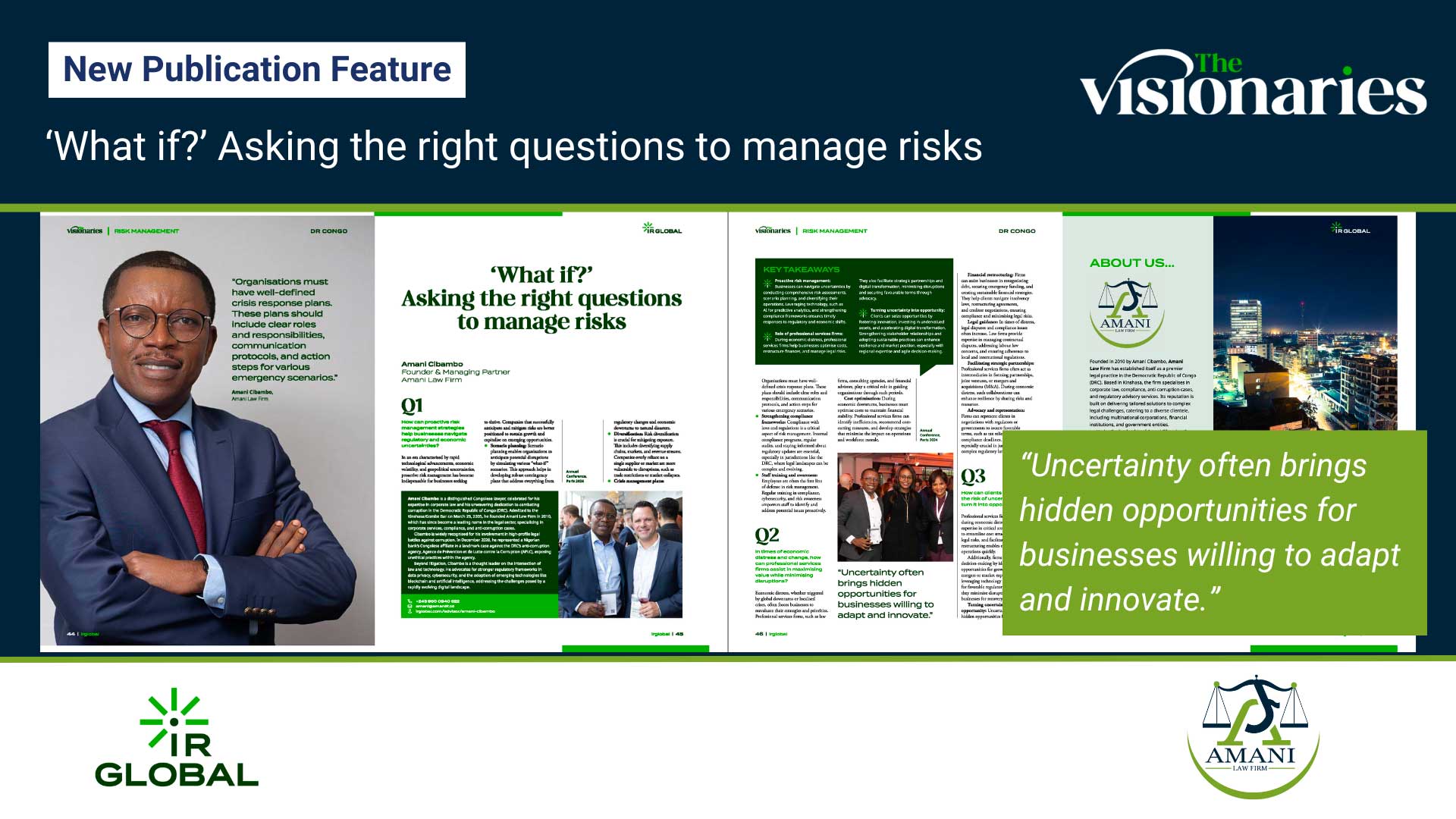- Par: Cibambo Amani Amani
- Catégorie: None
What if Asking the right questions to manage risks

‘What if?’ Asking the right questions to manage risks
How can proactive risk management strategies help businesses navigate regulatory and economic uncertainties?
In an era characterised by rapid technological advancements, economic volatility, and geopolitical uncertainties, proactive risk management has become indispensable for businesses seeking to thrive. Companies that successfully anticipate and mitigate risks are better positioned to sustain growth and capitalise on emerging opportunities.
- Scenario planning: Scenario planning enables organisations to anticipate potential disruptions by simulating various “what-if ” scenarios. This approach helps in developing robust contingency plans that address everything from regulatory changes and economic downturns to natural disasters.
- Diversification: Risk diversification is crucial for mitigating exposure. This includes diversifying supply chains, markets, and revenue streams. Companies overly reliant on a single supplier or market are more vulnerable to disruptions, such as trade restrictions or market collapses.
- Crisis management plans: Organisations must have well-defined crisis response plans. These plans should include clear roles and responsibilities, communication protocols, and action steps for various emergency scenarios.
- Strengthening compliance frameworks: Compliance with laws and regulations is a critical aspect of risk management. Internal compliance programs, regular audits, and staying informed about regulatory updates are essential, especially in jurisdictions like the DRC, where legal landscapes can be complex and evolving.
- Staff training and awareness: Employees are often the first line of defense in risk management. Regular training in compliance, cybersecurity, and risk awareness empowers staff to identify and address potential issues proactively.
In times of economic distress and change, how can professional services firms assist in maximising value while minimising disruptions?
Economic distress, whether triggered by global downturns or localised crises, often forces businesses to reevaluate their strategies and priorities. Professional services firms, such as law firms, consulting agencies, and financial advisors, play a critical role in guiding organisations through such periods.
Cost optimisation: During economic downturns, businesses must optimise costs to maintain financial stability. Professional services firms can identify inefficiencies, recommend cost-cutting measures, and develop strategies that minimise the impact on operations and workforce morale.
Financial restructuring: Firms can assist businesses in renegotiating debt, securing emergency funding, and creating sustainable financial strategies. They help clients navigate insolvency laws, restructuring agreements, and creditor negotiations, ensuring compliance and minimising legal risks.
Legal guidance: In times of distress, legal disputes and compliance issues often increase. Law firms provide expertise in managing contractual disputes, addressing labour law concerns, and ensuring adherence to local and international regulations.
Facilitating strategic partnerships: Professional services firms often act as intermediaries in forming partnerships, joint ventures, or mergers and acquisitions (M&A). During economic distress, such collaborations can enhance resilience by sharing risks and resources.
Advocacy and representation: Firms can represent clients in negotiations with regulators or governments to secure favorable terms, such as tax relief or extended compliance deadlines. This advocacy is especially crucial in jurisdictions with complex regulatory landscapes.
How can clients approach the risk of uncertainty and turn it into opportunity?
Professional services firms add value during economic distress by offering expertise in critical areas. Their ability to streamline cost structures, manage legal risks, and facilitate financial restructuring enables clients to stabilise operations quickly.
Additionally, firms support strategic decision-making by identifying opportunities for growth, such as mergers or market expansions. By leveraging technology and advocating for favorable regulatory conditions, they minimise disruptions and position businesses for recovery.
Turning uncertainty into opportunity: Uncertainty often brings hidden opportunities for businesses willing to adapt and innovate. Instead of perceiving uncertainty as a threat, organisations can use it as a catalyst for growth and transformation. Below are strategies to achieve this:
Fostering innovation: Periods of uncertainty encourage businesses to reimagine their products, services, and operations. Companies that pivot quickly often emerge stronger. For instance, manufacturers may diversify into essential goods during supply chain disruptions.
Investing in undervalued assets: Economic downturns often lead to undervalued assets in real estate, stock markets, or business acquisitions. Businesses with strong financial positions can capitalise on these opportunities to strengthen their market position.
Strengthening relationships: Uncertain times call for increased collaboration with stakeholders. Transparency and consistent communication with employees, customers, and investors build trust and loyalty. Companies that prioritise stakeholder relationships often emerge with a stronger reputation.
Emphasising sustainability: Investing in sustainability initiatives can differentiate businesses and appeal to environmentally conscious consumers. Initiatives like renewable energy adoption or sustainable sourcing can enhance brand value while reducing costs.
Leveraging regional expertise: In the DRC, businesses can explore sectors with significant growth potential, such as renewable energy, technology, and agriculture. Understanding local market dynamics and regulatory environments is key to unlocking these opportunities.
Agile decision-making: Flexibility is crucial in navigating uncertainty. Businesses should adopt agile methodologies that allow for quick adjustments to strategies and operations in response to changing circumstances.

